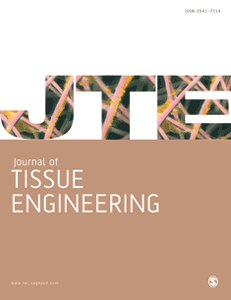Enhancing pre-clinical research with simplified intestinal cell line models
IF 6.7
1区 工程技术
Q1 CELL & TISSUE ENGINEERING
引用次数: 0
Abstract
Two-dimensional culture remains widely employed to determine the bioavailability of orally delivered drugs. To gain more knowledge about drug uptake mechanisms and risk assessment for the patient after oral drug admission, intestinal in vitro models demonstrating a closer similarity to the in vivo situation are needed. In particular, Caco-2 cell-based Transwell® models show advantages as they are reproducible, cost-efficient, and standardized. However, cellular complexity is impaired and cell function is strongly modified as important transporters in the apical membrane are missing. To overcome these limitations, primary organoid-based human small intestinal tissue models were developed recently but the application of these cultures in pre-clinical research still represents an enormous challenge, as culture setup is complex as well as time- and cost-intensive. To overcome these hurdles, we demonstrate the establishment of primary organoid-derived intestinal cell lines by immortalization. Besides exhibiting cellular diversity of the organoid, these immortalized cell lines enable a standardized and more cost-efficient culture. Further, our cell line-based Transwell®-like models display an organ-specific epithelial barrier integrity, ultrastructural features and representative transport functions. Altogether, our novel model systems are cost-efficient with close similarity to the in vivo situation, therefore favoring their use in bioavailability studies in the context of pre-clinical screenings.利用简化的肠细胞系模型加强临床前研究
二维培养仍被广泛用于确定口服给药的生物利用度。为了获得更多关于药物吸收机制的知识,并对患者口服药物后的风险进行评估,需要建立更接近体内情况的肠道体外模型。其中,基于 Caco-2 细胞的 Transwell® 模型具有可重复性、成本效益高和标准化等优点。然而,由于顶端膜上的重要转运体缺失,细胞的复杂性受到影响,细胞功能也发生了很大变化。为了克服这些局限性,最近开发出了基于原代类器官的人类小肠组织模型,但将这些培养物应用于临床前研究仍是一个巨大的挑战,因为培养物的设置非常复杂,而且耗时耗钱。为了克服这些障碍,我们展示了通过永生化建立原代器官来源肠细胞系的方法。除了展示类器官细胞的多样性,这些永生化细胞系还能实现标准化和更具成本效益的培养。此外,我们基于细胞系的 Transwell® 类模型显示了器官特异性上皮屏障的完整性、超微结构特征和代表性转运功能。总之,我们的新型模型系统成本效益高,与体内情况非常相似,因此更适合用于临床前筛选的生物利用度研究。
本文章由计算机程序翻译,如有差异,请以英文原文为准。
求助全文
约1分钟内获得全文
求助全文
来源期刊

Journal of Tissue Engineering
Engineering-Biomedical Engineering
CiteScore
11.60
自引率
4.90%
发文量
52
审稿时长
12 weeks
期刊介绍:
The Journal of Tissue Engineering (JTE) is a peer-reviewed, open-access journal dedicated to scientific research in the field of tissue engineering and its clinical applications. Our journal encompasses a wide range of interests, from the fundamental aspects of stem cells and progenitor cells, including their expansion to viable numbers, to an in-depth understanding of their differentiation processes. Join us in exploring the latest advancements in tissue engineering and its clinical translation.
 求助内容:
求助内容: 应助结果提醒方式:
应助结果提醒方式:


